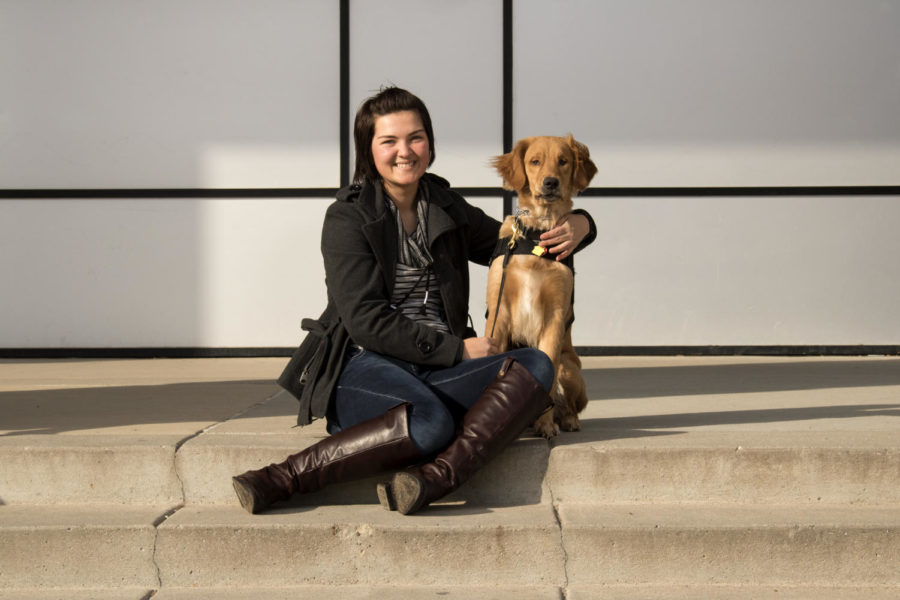Service dogs offer necessary therapy
Cierra Featherstone, a junior in history, and her service dog Quinn sit on the steps outside Parks Library on Iowa State campus. Quinn is trained to be a mobility service dog.
February 18, 2016
For some students, their pets provide comfort, but for others, their pets provide much needed therapy and assistance.
The assistance animal policy at Iowa State was developed in July 2015. However, people have used service animals for decades.
A service animal is individually trained to do specific work or perform tasks for the benefit of a person with a disability, including but not limited to physical, sensory, psychiatric, intellectual or other mental disabilities, according to the ISU website. Service animals are typically dogs, although the court system has also recognized miniature ponies as a service animal as well.
Emotional support animals are a more recent accommodation. They are any species of animal providing emotional support, well-being or comfort that eases one or more identified symptoms or effects of a disability, according to the website. An emotional support animal can be any animal the owner wishes.
Steven Moats, the director of Student Disability Resources, said service dogs are specially trained to assist with blindness, alert owners to impending seizure activity, pick items up off the floor, open doors, calm their owners and more.
Cierra Featherstone, junior in history at Iowa State, has a 9-month-old golden retriever named Quinn that is currently receiving training to become a mobility service dog. She will eventually help Featherstone maneuver up and down the stairs.
“When she’s at home she’s a completely different dog than when she’s at the dorm,” Featherstone said on splitting up work and play time.
She pointed out that the dorm is more of a working environment, but Quinn doesn’t listen as much at home. She knows when the vest or collar is put on it’s time to train.
Iowa recognizes service animals in training have the same privileges of service dogs, but because Quinn is still a service dog in training, she is not recognized by the university to have the same privileges as a trained service dog. This is for educational purposes.
Service animals are allowed nearly everywhere on campus, while emotional support dogs are only allowed in housing units. This is because service animals have a more critical task to carry out when assisting their owner. Moats said special accommodations can be made for emotional support animals, but documentation must be provided to identify the importance of the therapy on the student.
Featherstone and Moats both agree that service animals being anywhere in public can lead to challenges.
Moats said it is the owner’s responsibility to inform people when they want them to pet or otherwise touch their animal.
With Quinn living in the dorms with her, Featherstone said people don’t understand it’s better to not mess with her dog when Featherstone is with her or is on her leash. “I wish people would just kind of understand that if you see a dog on campus, obviously it’s not there for fun — it’s there to do something.”
Moats said, “The rule of thumb, so to speak, is to not pet a service animal that’s working.”
Moats also said animal allergies are an example of a challenge that comes with service animals being allowed in eating establishments and other public areas.
If an assistance animal or its owner were to violate a campus rule, Moats said a starting point is the student gets referred back to the Student Disability Resources office.
“If a student and his or her animal is disruptive the instructor is encouraged to try to resolve that situation themselves, but if that doesn’t work, then the instructor will probably get in touch with our office for some assistance,” he said.
From there, the student would come into the office and discuss ways to improve the situation, Moats said.
“We would try our very best to try to make the situation better,” Moats said. “We just want to support students when they need these assistance animals.”
Featherstone said Quinn has positively affected her life in the sense that she provides inexpensive therapy.
“She gives me a reason to get up out of bed, for better or for worse,” Featherstone said.

















